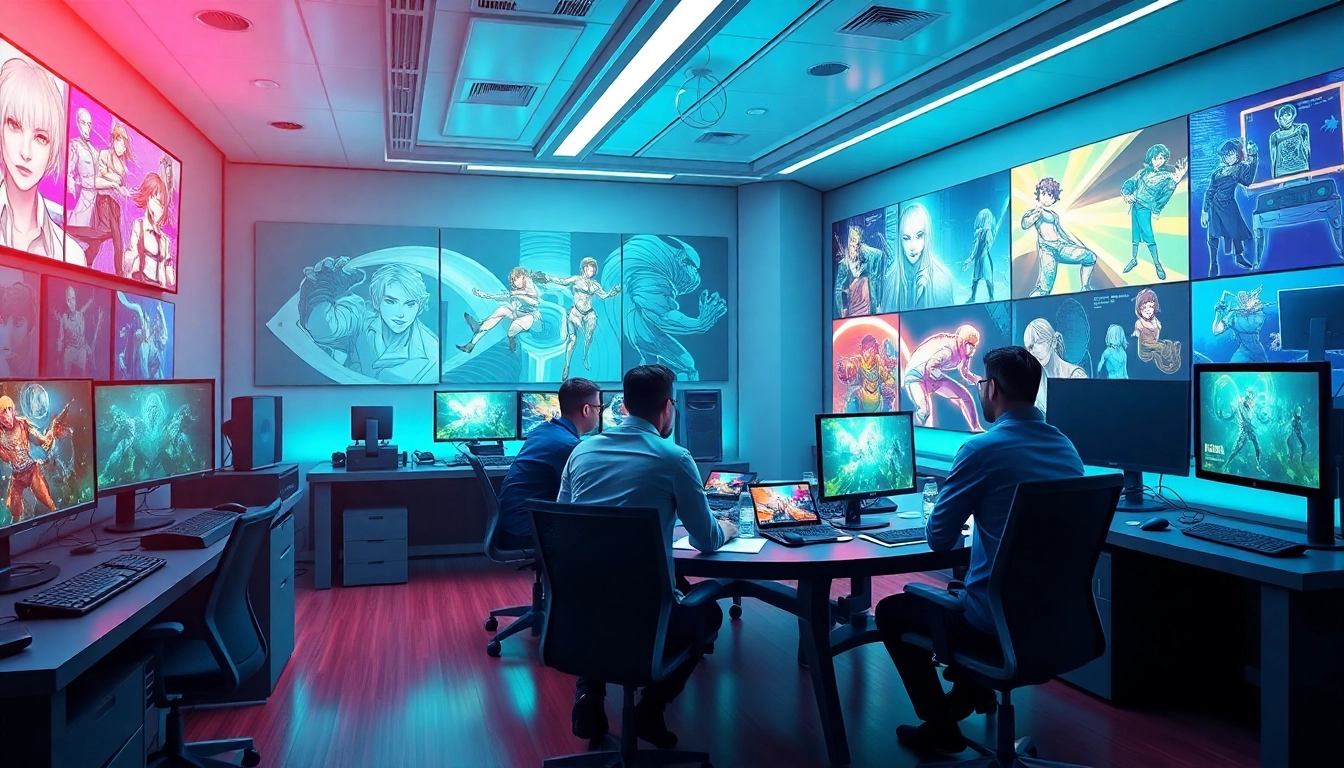Understanding the Landscape of the UK Game Studio
The UK has carved out a prominent and influential space in the global gaming industry, housing a diverse array of uk game studios that cater to various gaming tastes and platforms. With its unique blend of creativity, technological innovation, and strategic investment in talent, the UK gaming sector continues to thrive, penetrating international markets and setting trends that often influence the global gaming landscape. In this article, we will delve into the different facets of this vibrant ecosystem, examining the key players, challenges, and best practices for collaboration.
Overview of Prominent UK Game Studios
Several studios in the UK have risen to prominence, becoming household names in the gaming community. The industry boasts prestigious developers like Rockstar North, known for the iconic Grand Theft Auto series, and Media Molecule, famous for creating groundbreaking titles such as LittleBigPlanet and Dreams. Other notable studios include The Creative Assembly, known for its Total War franchise, and Codemasters, celebrated for its racing games like F1 and Dirt.
Key Players in the Game Development Market
The UK gaming industry is supported by a mix of independent studios and large corporations. For instance, EA Sports and Ubisoft have established significant operations in the UK, contributing to a healthy competition and a rich tapestry of creative output. The UK’s development scene is bolstered by hundreds of small indie studios, offering innovative gameplay experiences that push the boundaries of traditional gaming. This diversity in studio size and specialization allows for a multi-faceted approach to game development, satisfying a wide spectrum of player preferences.
Evolution of the UK Game Studio Scene
The evolution of the UK game studio landscape has been marked by significant technological advancements and a shift in consumer preferences. The traditional focus on console gaming has broadened to include mobile and PC gaming, leading studios to adapt their strategies accordingly. As a result, many UK game studios have embraced agile development methodologies, enhancing their responsiveness to market demands. Moreover, the advent of virtual reality (VR) and augmented reality (AR) technologies has opened up new avenues for creative expression within the industry.
Factors to Consider When Choosing a UK Game Studio
Studio Size and Expertise
When selecting a UK game studio, one of the first considerations should be the size and expertise of the studio. Larger studios typically have greater resources, allowing for more extensive projects, while smaller studios often provide a more personalized experience with strong communication channels. It is essential to assess the specific expertise of a studio, particularly in relation to the type of game you wish to develop. For instance, a studio like Playground Games specializes in open-world racing games, while others may focus more on narrative-driven titles.
Project Portfolio and Style
Reviewing a studio’s project portfolio is crucial in understanding their style, strengths, and weaknesses. Look for studios that have developed games in the genre you are interested in, as this will give you insights into their capabilities. Game studios often exhibit unique design philosophies, so it’s important to find a studio whose artistic direction aligns with your vision. Additionally, successful past projects can serve as indicators of a studio’s ability to execute high-quality work within a specified timeframe.
Client Testimonials and Industry Recognition
Testimonials from previous clients can provide valuable insights into a studio’s reliability and overall performance. Look for reviews that highlight positive experiences, with specific mentions of quality, communication, and timeliness. Industry recognition, such as awards and nominations, can further validate a studio’s reputation. Award-winning developers like Ninja Theory and Supermassive Games often set higher standards for creativity and quality, making them desirable partners for game development.
Common Challenges for UK Game Studios
Finding Skilled Talent
One of the most pressing challenges faced by UK game studios is sourcing skilled talent. Despite the high demand for qualified professionals in the gaming industry, there is often a shortage of candidates with the requisite skills. This has led to increased competition among studios to attract and retain top talent. To mitigate this challenge, many studios invest in internship programs and collaborate with educational institutions to foster a new generation of game developers, artists, and designers.
Adapting to Industry Trends
The gaming industry is characterized by rapid technological advancements and shifting consumer preferences. UK game studios must remain vigilant and adaptable, keeping pace with trends such as mobile gaming, eSports, and subscription-based models. This requires a commitment to continuous learning and development, as well as a willingness to pivot strategies when necessary. Many successful studios actively monitor market trends, leveraging data analytics to inform their design and marketing approaches.
Financial Sustainability in Game Development
Securing funding and maintaining financial sustainability can pose significant challenges for UK game studios, especially independent ones. The initial development costs for games can be high, and many studios rely on investors or early crowdfunding to launch projects. Careful financial planning and management are essential, as is the ability to navigate the complexities of revenue generation post-launch. Building revenue streams through in-game purchases or downloadable content (DLC) can provide additional financial stability.
Best Practices for Collaborating with a UK Game Studio
Effective Communication Strategies
Establishing effective communication strategies is critical when collaborating with a UK game studio. Clarity in expectations, project milestones, and feedback can significantly enhance productivity and satisfaction for both parties. Regular meetings, whether in-person or virtually, help ensure that everyone is aligned and able to address any challenges promptly. Utilizing collaboration tools like Slack or Trello can facilitate ongoing communication and project tracking.
Setting Realistic Expectations and Goals
When embarking on a game development project, it is important to set realistic expectations and goals. This involves not only defining the scope and timeline of the project but also understanding the technical limitations and resources available. Collaborating closely with the studio to determine achievable milestones can foster a transparent development process. Flexibility is also crucial; as challenges arise, being open to adapting timelines or project features can prevent frustration and conflict.
Fostering a Creative Partnership
Fostering a creative partnership entails creating an environment that encourages collaboration and innovation. Encourage team brainstorming sessions, where ideas can flow freely without judgment. Providing constructive feedback and celebrating small successes along the way can boost morale and creativity. Moreover, understanding the studio’s workflow and allowing space for their creative processes can lead to more effective results. Nurturing this partnership helps ensure that the final product aligns with your vision while also balancing the studio’s creative strengths.
Measuring Performance and Success in Game Development
Key Performance Indicators for Game Studios
When assessing the performance of a UK game studio, it’s important to establish key performance indicators (KPIs) that align with project objectives. These could include metrics such as project completion timelines, budget adherence, and player engagement statistics after launch. Other qualitative metrics, such as player satisfaction ratings and critical reviews, are also essential to gauge success. Regularly reviewing these KPIs can help identify areas of improvement and ensure that studios are meeting the expected standards.
Understanding User Feedback and Iterations
User feedback is a valuable resource for game studios, providing insights that can significantly improve future projects. Engaging with players through surveys, forums, and social media can yield constructive criticism that informs design and functionality choices. Iterative development, where feedback is incorporated at various stages, encourages continuous improvement and innovation. This approach can ultimately enhance player satisfaction and loyalty, ensuring a stronger foothold in the competitive market.
Evaluating Market Reception and Sales Performance
Evaluating market reception involves analyzing sales data, player retention rates, and community engagement post-launch. Understanding the dynamics of market trends and audience preferences is crucial for gauging a game’s success. Sales performance analysis can identify competitive positioning and help forecast future projects. This data-driven approach allows studios to refine their marketing strategies and gameplay offerings, securing a more successful outcome in subsequent releases.




